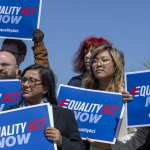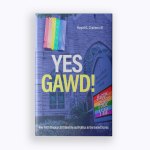For Rev. Ray McKinnon of Charlotte, North Carolina, questioning the church’s teachings is like pulling on a thread: Everything might unravel.
He welcomes that.
“The unraveling isn’t destruction,” he said. “It is creating something more beautiful, something where the circle is enlarged.”
McKinnon experienced this feeling as he wrestled with how LGBTQ+ people fit in the church community. Twenty years ago, McKinnon’s best friend, Tonetta, came out to him as gay. He told her that her conscience had been seared by the devil.
“And she’s still my friend,” he said with amazement. “She still loves me and talks to me.”
Over the past two decades, McKinnon has figured out how to reconcile his faith with his love for his best friend. He and Tonetta have been on a journey together, advocating for LGBTQ+ people within the United Methodist Church, by writing op-eds, preaching inclusion and collaborating with LGBTQ+ religious groups.
A new poll suggests that people like McKinnon are increasingly common. The Public Religion Research Institute, a nonprofit nonpartisan group, found that people across major religious groups support LGBTQ+ nondiscrimination protections.
Nearly 75 percent of religious people said they supported such protections, the poll found. The results challenge the dominant narrative that people of faith are opposed to the Equality Act, landmark LGBTQ+ civil rights legislation pending in Congress. Religious opposition to the bill was a recurring theme raised in March during a Senate Judiciary Committee hearing on the measure.
Support was highest among White mainline Protestants at 82 percent, followed closely by Hispanic Catholics at 81 percent. White Evangelicals were least likely to support the bill, but 62 percent of them still indicated they backed it. Support was high among other religions, too: 79 percent of Jewish people backed the bill as did 78 percent of Mormons.
Overall, less than one-fifth (19 percent) of Americans oppose LGBTQ+ nondiscrimination laws, the poll found. Support was highest among young people; 83 percent of Americans between ages 18-29 supported the protections compared to just 65 percent of people over the age of 65.
The poll did not include people of underrepresented faiths like Islam, Hinduism, Buddhism or Indigenous religions. Still, there is evidence that suggests growing support for the Equality Act among some minority faiths.
For example, the National Spiritual Assembly of the Bahá’ís of the United States generally doesn’t take a position on policy issues, communications manager Debra Taylor said in an email to The 19th.
However, “On the level of principle, our core belief is that all people should be treated with dignity and respect, and that unity is of paramount importance for the peace and wellbeing of society,” Taylor said.
Naomi Goldberg is the deputy director of the Movement Advancement Project, an organization that tracks the state of LGBTQ+ equality throughout the nation. She said that the poll reflects a growing rift between voters and their lawmakers, many of whom continue to oppose LGBTQ+ rights.
I think we know that generally, the public is very supportive of LGBTQ people and of discrimination protections.
Naomi Goldberg, deputy director of the Movement Advancement Project
“As someone who’s worked in the LGBTQ movement for more than a decade, I think we know that generally, the public is very supportive of LGBTQ people and of discrimination protections,” Goldberg said. “I think that this poll really speaks to that. We see majority support for non-discrimination, for the values of treating people as we’d like to be treated in all different contexts… when you look at age and race, religion, and political affiliation that the public really does support LGBTQ people being treated fairly.”
While the Equality Act has been criticized for curtailing religious liberty by mandating that business owners serve LGBTQ+ people, it would also strengthen protections for people of faith, people of color and women. The bill bolsters the Civil Rights Act of 1964, which protects religions, by adding retail stores taxis and ride shares to public accommodations. It does the same for barber shops, where women might be charged more for the same haircuts as men.
McKinnon agrees. He tells his parishioners that queer issues and Black issues are one in the same.
“I think the data really speaks to both broad support and kind of the intersection of identities and the importance of non discrimination as a core American value and the extent to which people support non discrimination across a number of dimensions,” Goldberg said.
“My reality is that we’re not as divided when it comes to protections as folks think we are, but we are susceptible to sensationalism that happens from folks on the far right,” he said. “This whole tactic has been used to really rile up folks against LGBTQ+ folks, against Black folks. And I think that’s the other thing. It’s like, yo, this is the playbook.”






